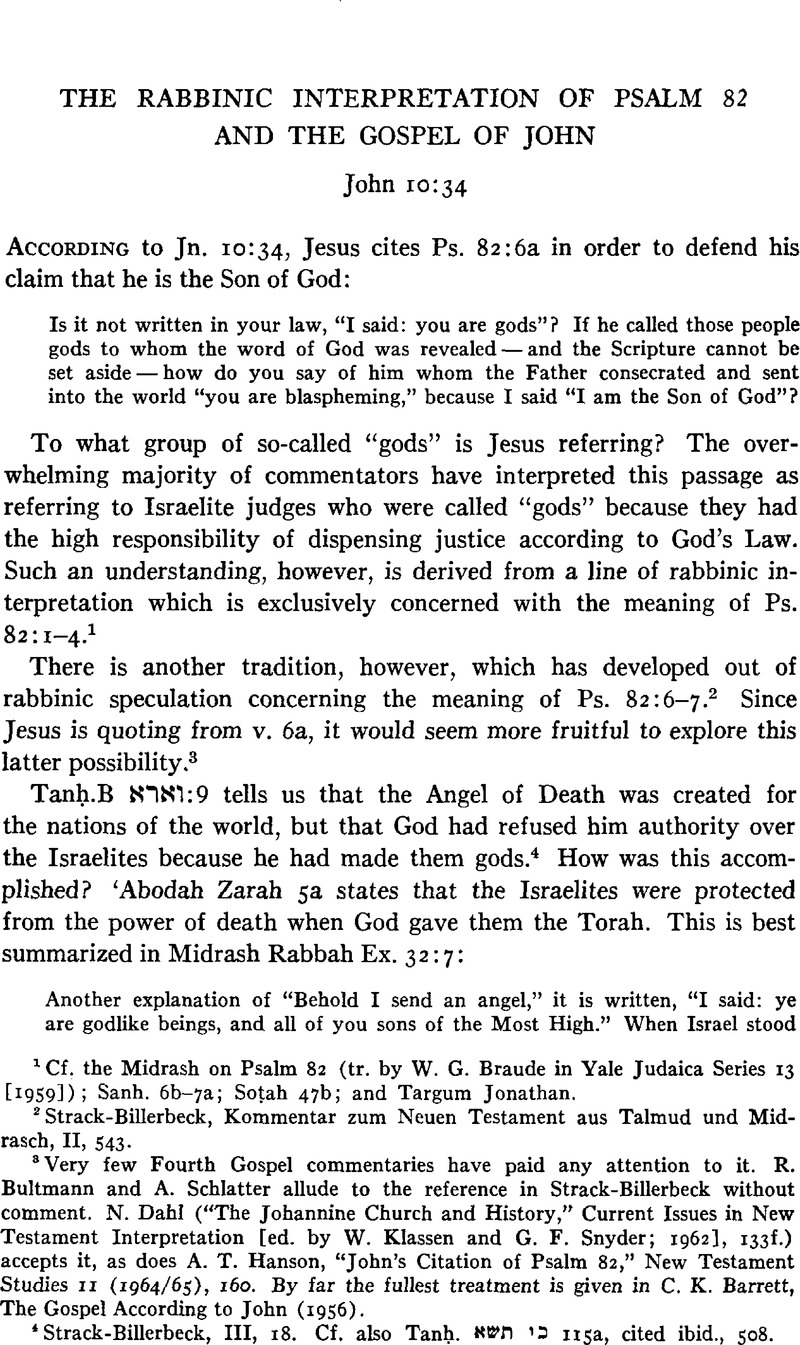Article contents
The Rabbinic Interpretation of Psalm 82 and the Gospel of John: John 10:34
Published online by Cambridge University Press: 10 June 2011
Abstract

- Type
- Notes and Observations
- Information
- Copyright
- Copyright © President and Fellows of Harvard College 1966
References
1 Cf. the Midrash on Psalm 82 (tr. by W. G. Braude in Yale Judaica Series 13 [1959]); Sanh. 6b–7a; Sotah 47b; and Targum Jonathan.
2 Strack-Billerbeck, Kommentar zum Neuen Testament aus Talmud und Midrasch, II, 543.
3 Very few Fourth Gospel commentaries have paid any attention to it. R. Bultmann and A. Schlatter allude to the reference in Strack-Billerbeck without comment. N. Dahl (“The Johannine Church and History,” Current Issues in New Testament Interpretation [ed. by W. Klassen and G. F. Snyder; 1962], 133f.) accepts it, as does Hanson, A. T., “John's Citation of Psalm 82,” New Testament Studies 11 (1964/1965), 160Google Scholar. By far the fullest treatment is given in C. K. Barrett, The Gospel According to John (1956).
4 Strack-Billerbeck, III, 18. Cf. also Tanh. אשח יכ 115a, cited ibid., 508.
5 Soncino edition, by H. Freedman and M. Simon, 411.
6 Cf. also Midrash Rabbah Qohel. 3:16 and Midrash Rabbah Num. 16:24.
7 Abodah Zarah 5a maintains that the rebellion at Sinai brought sex into the world.
8 W. Bauer, A Greek-English Lexicon … (tr. and ed. by Arndt-Gingrich; 1957), 159.
9 Of course the phrase ὁ λóγος τοῦ θεοῦ ἐγένετο πρὸς … applies to other prophets in the LXX (Jer. 1:2, 11, 13:8; Ez. 6:1; Hos. 1:1). Thus it might be possible to assume that Jesus was referring to all the Old Testament prophets to whom the Word of the Lord had been revealed (cf. Wisd. 7:24–27). But the use of the aorist, plus the fact that God spoke to them as a group, calling them gods, would seem to indicate a specific event rather than a repeated occurrence.
10 The above-cited references from the Talmud and Midrashim were not written down until well into the Christian era. We may assume, however, that these traditions were known during the time of Jesus in some form because they were so widespread and varied in many types of rabbinic literature. Our best proof, of course, is Jn. 10:34ft. For the acquaintance of the Fourth Gospel writer with rabbinical exegesis and argumentation, cf. C. H. Dodd, The Interpretation of the Fourth Gospel (1954), 76ff.
11 The Semitic background of τέκνα θεοῦ (Jn. 1:12) (= Heb. [םיהלאה] ילא יככ) need not indicate that God is the physical progenitor, but rather that such beings belong to the genus “divinity.” The phrase has far more mythological overtones than the English “children of God” would suggest.
12 Cf. esp. R. Bultmann, “Der religionsgeschichtliche Hintergrund des Prologs zum Johannes-Evangelium,” EUCHARISTERION II (Festschrift H. Gunkel; 1923), 6–19.
13 Prov. 3:19f., 8:22–31; Sir. 1:1–9, 24:3–6; Wisd. 7:22, 8:3.
14 Rabbinic literature expands this by stating that the Torah was first offered to all the other nations, but was accepted by Israel alone. Cf. R. H. Charles (ed.), The Apocrypha and Pseudepigrapha, I, 397, ad Sir. 24:7.
15 Bar. 3:29–4:1 continues this theme, specifically identifying Sophia with the Torah. We find, however, that the Sinai myth has been generalized so that all who obey its words shall have life, while those who turn aside shall die. Cf. also Wisd. 6:18–19, 7:25–27.
16 Bultmann, op. cit., 10, disagrees. He believes that the original myth told of Wisdom's seeking a place on earth, being rejected by mankind, and thus reascending into heaven (as reflected in En. 42:1ff.). Wisdom's finding a הלחו in Israel, he maintains, is a later development of the myth. However, there is no way to prove this. Our interpretation would seem to be the more natural progression. “Another element which would tie the descent of Wisdom to the Sinai event is the emphasis in the Wisdom myth upon her seeking a place to “tabernacle”; see below.
18 En. 5:8, 48:1, 49:1; 4 Ezr. 8:52.
19 Pointed out by R. M. Grant, Gnosticism and Early Christianity (1959), 152ff.
20 l Cor. l:24, 2:61.
21 Mt. 11:25–30; also Lk. 11:49, cf. Mt. 23:34.
22 Although σκηνω is not always used in the LXX to translate ןכש, it has the same meaning and sound. Surely the Fourth Gospel writer had this concept in mind.
23 Cf. Dodd, op. cit., 82; and Barrett, op. cit., 139.
24 Or, according to the Evangelist (1:18), not at all.
25 It is beyond the scope of this paper to enter the debate regarding the origin of the Johannine Prologue. Bultmann's thesis that it is ultimately derived from a pagan myth seems indisputable. However, we believe that our observations have shown that the pagan myth of Wisdom's descent had been incorporated into Jewish thought by the time of Jesus, and reworked into a “Redeemer myth” as it was related to speculation over the meaning of Ps. 82:6–7 — thus strengthening the arguments of those scholars who see Palestinian Judaism as the background for the Prologue.
- 7
- Cited by




